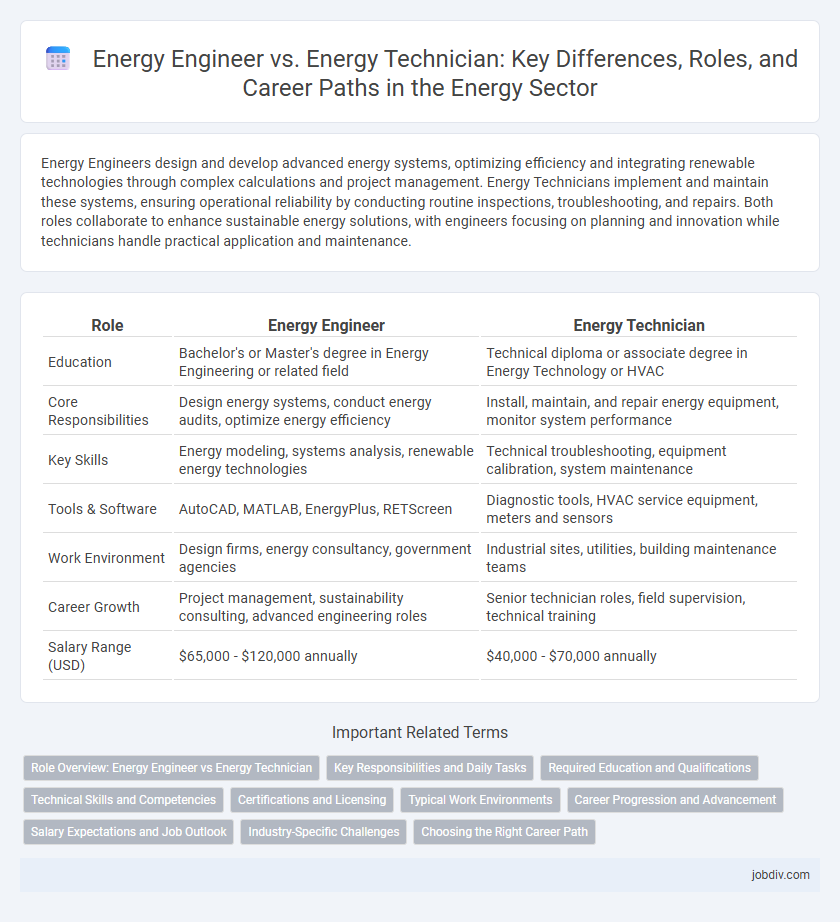Energy Engineers design and develop advanced energy systems, optimizing efficiency and integrating renewable technologies through complex calculations and project management. Energy Technicians implement and maintain these systems, ensuring operational reliability by conducting routine inspections, troubleshooting, and repairs. Both roles collaborate to enhance sustainable energy solutions, with engineers focusing on planning and innovation while technicians handle practical application and maintenance.
Table of Comparison
| Role | Energy Engineer | Energy Technician |
|---|---|---|
| Education | Bachelor's or Master's degree in Energy Engineering or related field | Technical diploma or associate degree in Energy Technology or HVAC |
| Core Responsibilities | Design energy systems, conduct energy audits, optimize energy efficiency | Install, maintain, and repair energy equipment, monitor system performance |
| Key Skills | Energy modeling, systems analysis, renewable energy technologies | Technical troubleshooting, equipment calibration, system maintenance |
| Tools & Software | AutoCAD, MATLAB, EnergyPlus, RETScreen | Diagnostic tools, HVAC service equipment, meters and sensors |
| Work Environment | Design firms, energy consultancy, government agencies | Industrial sites, utilities, building maintenance teams |
| Career Growth | Project management, sustainability consulting, advanced engineering roles | Senior technician roles, field supervision, technical training |
| Salary Range (USD) | $65,000 - $120,000 annually | $40,000 - $70,000 annually |
Role Overview: Energy Engineer vs Energy Technician
Energy Engineers design and implement advanced systems to optimize energy efficiency, focusing on renewable energy integration, sustainability assessments, and complex energy modeling. Energy Technicians support engineers by maintaining energy systems, conducting performance tests, and troubleshooting equipment to ensure operational efficiency. While engineers develop strategic energy solutions, technicians handle practical applications and field diagnostics.
Key Responsibilities and Daily Tasks
Energy Engineers develop and implement energy efficiency strategies, analyze system performance, and design sustainable energy solutions to optimize industrial and commercial energy use. Energy Technicians conduct routine maintenance, monitor energy systems, collect data, and troubleshoot equipment to ensure reliable operation and compliance with energy regulations. Both roles contribute to energy conservation but differ in technical depth, with engineers focusing on system design and analysis and technicians on practical application and system upkeep.
Required Education and Qualifications
Energy Engineers typically require a bachelor's degree in energy engineering, mechanical engineering, or a related field, emphasizing advanced knowledge in energy systems, thermodynamics, and sustainable technologies. Energy Technicians usually need a two-year associate degree or a technical diploma focusing on practical skills such as energy audits, equipment maintenance, and system installations. Certifications like Certified Energy Manager (CEM) enhance qualifications for engineers, while technicians often pursue credentials such as the Building Performance Institute (BPI) certification.
Technical Skills and Competencies
Energy Engineers possess advanced technical skills in energy system design, modeling, and efficiency optimization, with proficiency in software tools like AutoCAD, MATLAB, and energy simulation programs. Energy Technicians specialize in hands-on technical competencies such as equipment installation, maintenance, diagnostics, and troubleshooting of energy systems, emphasizing practical fieldwork and adherence to safety standards. Both roles require knowledge of energy regulations and sustainability practices, but engineers focus more on analysis and system improvement, while technicians handle the operational aspects of energy technologies.
Certifications and Licensing
Energy Engineers typically hold professional certifications such as Professional Engineer (PE) licensure, Certified Energy Manager (CEM), or Leadership in Energy and Environmental Design (LEED) accreditation, reflecting advanced expertise in energy systems design and sustainability. Energy Technicians often pursue certifications like the North American Technician Excellence (NATE) certification or Certified Energy Auditor (CEA), emphasizing practical skills in energy system installation, maintenance, and diagnostics. Licensing requirements for Energy Engineers usually involve a PE license acquired through education, experience, and examination, while Energy Technicians primarily obtain industry-specific certifications to validate technical competency.
Typical Work Environments
Energy Engineers typically work in research laboratories, design firms, and industrial plants where they develop and implement energy-efficient systems and technologies. Energy Technicians often operate in field locations, maintenance facilities, and power plants, focusing on the installation, troubleshooting, and repair of energy systems. Both roles require adapting to environments that prioritize safety and adherence to regulatory standards in the energy sector.
Career Progression and Advancement
Energy Engineers typically pursue advanced roles in energy management, system design, and project leadership, leveraging their technical expertise and engineering principles to optimize energy systems. Energy Technicians often advance by gaining certifications and specialized skills in equipment maintenance, data monitoring, and operational support, supporting engineers in implementing energy solutions. Career progression for engineers generally leads to strategic decision-making and innovation roles, whereas technicians focus on technical proficiency and operational efficiency within the energy sector.
Salary Expectations and Job Outlook
Energy Engineers typically earn higher salaries, with median annual wages around $95,000, reflecting their advanced expertise in designing and optimizing energy systems. Energy Technicians usually have median salaries near $55,000, emphasizing their role in maintaining and operating energy equipment. Job outlook for Energy Engineers is projected to grow by 8% over the next decade, driven by renewable energy innovations, while Energy Technicians are expected to see a 6% growth due to expanding energy infrastructure needs.
Industry-Specific Challenges
Energy engineers tackle complex system designs and efficiency improvements, addressing challenges like integrating renewable energy sources and complying with stringent environmental regulations. Energy technicians focus on operational support, equipment maintenance, and troubleshooting in energy plants, ensuring continuous performance despite demanding conditions such as fluctuating energy demands and equipment wear. Both roles are crucial in navigating industry-specific hurdles like grid stability, resource optimization, and evolving energy technologies.
Choosing the Right Career Path
Energy Engineers design and optimize energy systems by applying advanced principles of thermodynamics and sustainable technologies, often requiring a bachelor's degree in engineering and strong analytical skills. Energy Technicians focus on installing, maintaining, and troubleshooting energy equipment, typically needing technical certifications or associate degrees and hands-on experience. Selecting the right career path depends on whether you prefer engineering design and system analysis or practical technical work and field operations in the energy sector.
Energy Engineer vs Energy Technician Infographic

 jobdiv.com
jobdiv.com